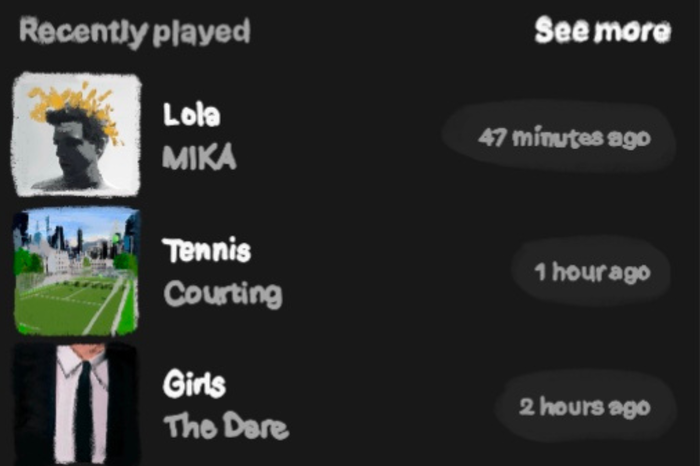The Hermes Experiment: Turning classical into a class act
Ava Fitzhugh chats with The Hermes Experiment, the Cambridge-born ensemble shaking up classical music with bold styles and innovative twists

The Hermes Experiment is a Cambridge-born contemporary classical ensemble featuring Anne Denholm-Blair (harp), Oliver Pashley (clarinet), Marianne Schofield (double bass), and Heloise Werner (voice). They have received recognition such as the Young Artist Award at the Royal Philharmonic Society in 2021 and are known for championing works by lesser-known composers often excluded from the classical canon, including Lili Boulanger, Barbara Strozzi, and Kerry Andrew. Before their upcoming concert at Kettle’s Yard, I spoke with harpist Anne Denholm and double bassist Marianne Schofield about the group’s journey and future.
How was The Hermes Experiment established?
Anne: The Hermes Experiment was established, gosh … ten years ago now.
Marianne: Has it been that long? Wow.
Anne: Yes, time flies! We all have individual careers now, of course. Our singer Heloise Werner, who you may have heard of, is now an associate artist at Wigmore Hall as both a composer and performer. We all met at this university and formed the group just after graduating. We knew each other, but we didn’t collaborate in the way we do now until after university.
What brought you all together as musicians?
Marianne: It was really Heloise who brought us together. We wanted to start something new, and she asked us to join. The economy wasn’t looking great at the time, so we thought, why not form a contemporary classical group? (laughs) It was just the three of us at first — harp, voice, and bass.
“The economy wasn’t looking great at the time, so we thought, why not form a contemporary classical group?”
Anne: But we realised we needed more instruments to balance the sound. Every successful group needs melody, harmony, and bass. Adding the clarinet gave us that extra layer of versatility.

And the name, ‘The Hermes Experiment’?
Anne: Oh, the name isn’t as profound as you might think. The old Cambridge music department webmail was called Hermes. Maybe it still is.
Did you find success right away?
Marianne: Definitely not. We had to do a lot of self-promotion, and even then, it didn’t happen overnight. We played in a lot of churches, often unpaid, and worked with other student friends. Some of us were also in a folk band during university, so that took up a lot of our time, too.
What sound did you want to achieve with this group?
Anne: We aimed to challenge the conventional chamber music setup. Our style has evolved a lot over time.
Marianne: Yes, it’s really a melting pot of styles. Most of our concerts are very varied — you just can’t pin us down!
“We try to bridge the gap through conversation, not just programme notes”
Who do you want to attract to your concerts?
Anne: The obvious answer is people who enjoy classical music, but we also want to reach those who might not expect to like it. We’ve played for some brave music clubs that took a chance on us, and when we perform at traditional venues, you can sometimes sense the audience wondering, “What on earth is this?” But often, it’s the older listeners who are the most open to having their minds changed. We try to bridge the gap through conversation, not just programme notes. It’s important for us to have an open relationship with the audience.
How do you create your pieces?
Marianne: Arrangements are usually assigned to one person, but the process is collaborative. We do a lot of group improvisation to see what works. We’ve had mentors who taught us to narrow our options, so now we might improvise using fewer chord sequences or swap roles freely during a piece.
Anne: We also explore less harmonic forms of improvisation and experiment with textures, allowing musical elements to come together organically. We’ve even worked with graphic scores and improvisations inspired by paintings, photographs, and text. Our transcriptions started off quite direct, but they’ve become much more intricate over time.

How do you choose your repertoire, and do you compose original music?
Marianne: We go through phases of actively seeking new arrangements. There’s usually a general discussion about what might work well.
Anne: We’ve collaborated with living composers like Anna Meredith and Nicole LeFanu on rearrangements. As for original compositions, we began composing together during a residency in March. It was the first time we set out to write our own music as a group.
How can Cambridge students create more innovative music opportunities?
Anne: One of the best things to do is to organise your own events. Having spaces where people can present non-traditional repertoire is important.
Marianne: We know students outside of Cambridge who started a music festival where they curated the entire programme. Students pitched projects, and the festival took place in free venues. It was a fantastic chance for collaboration and creativity in programming.
What’s next for The Hermes Experiment?
Anne: We want to continue creating contemporary music that reflects the world around us. We’re currently finalising the programme for our second album, so keep an eye out!
 News / Eight Cambridge researchers awarded €17m in ERC research grants27 December 2025
News / Eight Cambridge researchers awarded €17m in ERC research grants27 December 2025 News / Downing investigates ‘mysterious’ underground burial vault 29 December 2025
News / Downing investigates ‘mysterious’ underground burial vault 29 December 2025 Lifestyle / Ask Auntie Alice29 December 2025
Lifestyle / Ask Auntie Alice29 December 2025 Sport / Hard work, heartbreak and hope: international gymnast Maddie Marshall’s journey 29 December 2025
Sport / Hard work, heartbreak and hope: international gymnast Maddie Marshall’s journey 29 December 2025 Interviews / Meet Juan Michel, Cambridge’s multilingual musician29 December 2025
Interviews / Meet Juan Michel, Cambridge’s multilingual musician29 December 2025










